In the fourth instalment of a series on how HK’s creative industry people are adopting alternative strategies to reach out to audiences and creating new work in the time of a pandemic and where they stand compared to their counterparts elsewhere, Mathew Scott turns the spotlight on the spirit of sharing seen in the city’s film fraternity.
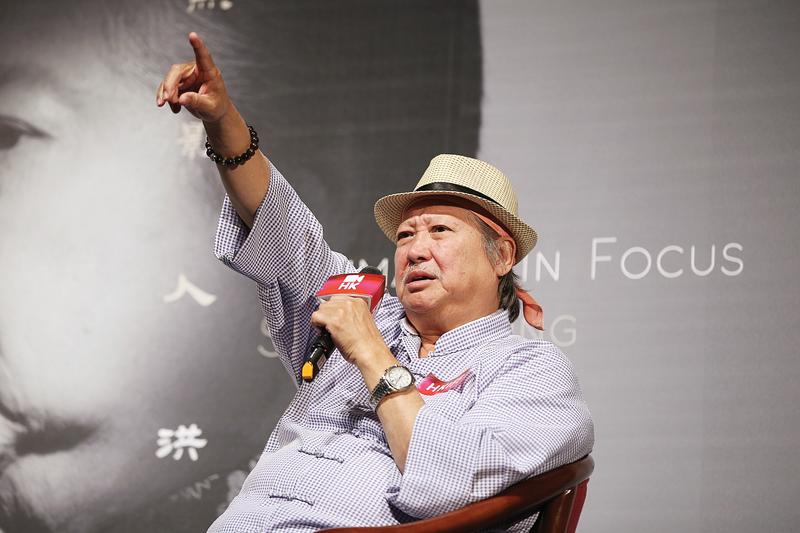 Among the videos shared by Hong Kong International Film Festival, the one featuring actor, director, producer and martial artist Sammo Hung has proved to be highly popular. (PHOTO PROVIDED TO CHINA DAILY)
Among the videos shared by Hong Kong International Film Festival, the one featuring actor, director, producer and martial artist Sammo Hung has proved to be highly popular. (PHOTO PROVIDED TO CHINA DAILY)
The film industry has been among the hardest hit by the global shutdown enforced by the spread of the COVID-19 virus.
Cinemas were among the first establishments to close doors — almost universally — back in February and March once it became apparent that social distancing, and even isolation, were among the best practises needed in trying to minimize the spread of the virus.
Film festivals have been forced to abandon plans for their 2020 editions, at least in their traditional forms, while film production has pretty much ground to a halt. The estimations of revenue loss are staggering, with trade bible The Hollywood Reporter predicting it could cost the industry as much as US$5 billion globally.
The past few weeks have seen the gradual re-opening of cinemas in some cities, Hong Kong included. However, social distancing requirements are still in place. Seat numbers have been reduced significantly and box-office receipts will be down for the foreseeable future everywhere.
But there have been some bright sparks of inspiration through all the gloom.
The shutdown has forced the film world to examine the very way it reaches its audience, with some exciting innovations emerging, such as an increase in direct-to-streaming releases from the world’s major studios, while it seems film lovers (and makers) everywhere have also been given a timely reminder of the purity of the cinema-going experience.
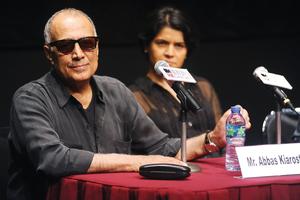 Hong Kong International Film Festival has uploaded Iranian auteur Abbas Kiarostami’s master class given at Hong Kong Arts Centre in 2013 on their Youtube channel. (PHOTO PROVIDED TO CHINA DAILY)
Hong Kong International Film Festival has uploaded Iranian auteur Abbas Kiarostami’s master class given at Hong Kong Arts Centre in 2013 on their Youtube channel. (PHOTO PROVIDED TO CHINA DAILY)
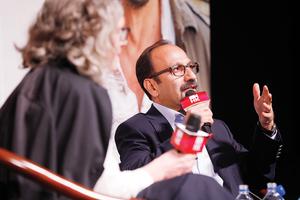 Iranian filmmaker Asghar Farhadi’s master class given during Hong Kong International Film Festival 2019 can now be accessed on Youtube. (PHOTO PROVIDED TO CHINA DAILY)
Iranian filmmaker Asghar Farhadi’s master class given during Hong Kong International Film Festival 2019 can now be accessed on Youtube. (PHOTO PROVIDED TO CHINA DAILY)
Value additions
“It has been quite inspiring,” says Clarence Tsui, director of Hong Kong’s Broadway Cinematheque. “Despite the lockdown people have been doing some things outside of the box in terms of how programers and filmmakers are trying to engage audiences with alternative visions of reality and cinema. People do want to go to the cinema. Not because they are suffering from cabin fever. They have been acknowledging that sometimes watching films is a collective experience.”
Once the Hong Kong cinemas seemed set for a temporary closure following a government directive, Tsui and his team found their social media platforms buzzing with chatter.
“After the cinemas closed we had a lot of traffic from people saying they wanted them to reopen,” says Tsui. “So we started thinking about getting some filmmakers and programers talking about what films they would want to see on the big screen once the cinemas were open again.”
 An interview to mark the 45th year of actress Brigitte Lin Ching-hsia’s debut, recorded during Hong Kong International Film Festival 2018, is now available on Youtube. (PHOTO PROVIDED TO CHINA DAILY)
An interview to mark the 45th year of actress Brigitte Lin Ching-hsia’s debut, recorded during Hong Kong International Film Festival 2018, is now available on Youtube. (PHOTO PROVIDED TO CHINA DAILY)
Calling in favors from their global connections, the BC team was then able to produce a unique series of Facebook and Instagram videos featuring such names as mainland auteur Jia Zhangke, Hong Kong’s very own Cheuk Cheung and Locarno Film Festival head Lili Hinstin sharing their thoughts on what they’ve missed during the lockdown.
“We found it has actually resonated with what people are thinking and what they would watch on a proper screen, in the cinema, with all the trappings. It’s actually interesting in that it shows that the big-screen experience can’t be replicated. We have people who talked to the camera and then we have people like Lili Hinstin who did something that wouldn’t look out of place in a (Jean-Luc) Goddard film.”
 Documentary filmmaker Cheuk Cheung from Hong Kong was featured in the Broadway Cinematheque-hosted online sharing session. (PHOTO PROVIDED TO CHINA DAILY)
Documentary filmmaker Cheuk Cheung from Hong Kong was featured in the Broadway Cinematheque-hosted online sharing session. (PHOTO PROVIDED TO CHINA DAILY)
That included borrowing a neighbour’s dog and heading outside to discuss her preferences.
Such has been the success of the videos that Tsui and his team are now looking to future collaborations with an eye on expanding the online connections between filmmakers and their audience that social distancing has brought about.
“All these activities we have been experiencing online also add to the cinematic experience,” says Tsui. “We can provide people with context that might not have happened before. People now want to know more about the raison d’etat, or why these filmmakers did what they did. Earlier, people would just go to the films but over these past few weeks they have been going online, watching interviews and this actually adds to the cinematic experience. It embellishes what they would usually get from the screen.”
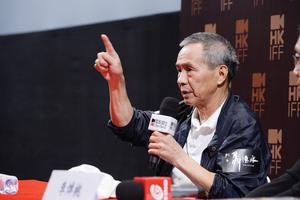 Filmmaker, screenwriter, producer and actor, Hou Hsiao-hsien’s Q&A during Hong Kong International Film Festival 2017 is now available to watch on Youtube. (PHOTO PROVIDED TO CHINA DAILY)
Filmmaker, screenwriter, producer and actor, Hou Hsiao-hsien’s Q&A during Hong Kong International Film Festival 2017 is now available to watch on Youtube. (PHOTO PROVIDED TO CHINA DAILY)
Lockdown shorts
As well as appearing on the BC program here in Hong Kong, Jia has contributed to a project initiated by Greece’s Thessaloniki Film Festival, which commissioned eight local directors and 14 from outside the country to produce three-minute shorts about their lockdown experiences. Jia shot his segment in black and white, over a day, on his cell phone.
The director — who also runs his own annual festival in the northern city of Pingyao — says he sees such initiatives as necessary, given current global conditions, but he also stresses these will be temporary.
“Because of this pandemic social distancing measures are in place but the whole industry relies on certain ways to disseminate new works to its audience,” says Jia. “Going online is one solution and there could be some innovative ways to distribute these works but at the end of the day the core value of a film festival is the congregation.
“Gathering is the original intention of this art form. Film is about gathering hundreds of thousands of people together so that they share the same feelings. By doing that they share a kind of consciousness. That is very important. That’s why film is a form of art that by nature brings people together. Online activities cannot replicate that.”
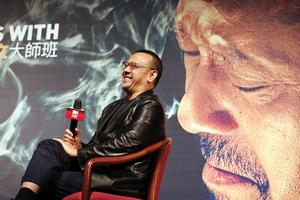 The witty remarks made by Chinese writer, director and actor Jiang Wen during his master class at Hong Kong International Film Festival 2019 can now be enjoyed by all. (PHOTO PROVIDED TO CHINA DAILY)
The witty remarks made by Chinese writer, director and actor Jiang Wen during his master class at Hong Kong International Film Festival 2019 can now be enjoyed by all. (PHOTO PROVIDED TO CHINA DAILY)
Rooftop screenings
The world’s major films festivals — including the likes of the famed Cannes event in France — are currently in the process of working out how exactly they can stage their events online. They have also been considering whether to combine online screenings and activities with the traditional live events.
While major Hollywood studios such as Universal have taken what would usually be tent-pole films such as Trolls World Tour and released them online, others, such as India’s Eros Now TT platform have looked to the crisis itself in order to tap into the mood, globally, at the moment.
Eros have since last week been streaming the short-form series A Viral Wedding with the narrative following a couple forced to put their plans of a grand, traditional wedding on hold — as they come up with a way to host it online.
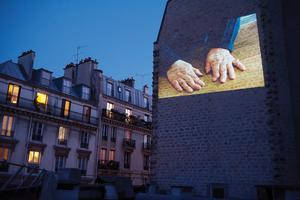 A festival of free-to-access rooftop screenings, La Clef Survival, was launched in Paris since the lockdown began. (PHOTO PROVIDED TO CHINA DAILY)
A festival of free-to-access rooftop screenings, La Clef Survival, was launched in Paris since the lockdown began. (PHOTO PROVIDED TO CHINA DAILY)
Meanwhile in Paris, the lockdown has seen the operators of one particular cinema take matters into their own hands.
For the six months prior to cinemas in the French capital being shut, a collective of cinema-lovers and film industry professionals had taken over what was the defunct Cinema La Clef, operating it under the “La Clef Revival” moniker and holding nightly screenings as they looked to gather the funding and government support to ensure the cinema’s survival.
Once the lockdown came, these people thought immediately of the local audience they had been serving — and so launched “La Clef Survival”, with rooftop screenings of classics such as the film noir gem The Night of the Hunter (1955) visible to the surrounding apartments and (safely distanced) outdoor crowds.
 Locarno Film Festival head, Lili Hinstin, decided to go for an on-camera walk during the video conferencing hosted by Broadway Cinematheque. (PHOTO PROVIDED TO CHINA DAILY)
Locarno Film Festival head, Lili Hinstin, decided to go for an on-camera walk during the video conferencing hosted by Broadway Cinematheque. (PHOTO PROVIDED TO CHINA DAILY)
“Many neighbors thanked us and even offered us some home-made masks,” explains one of the La Clef Survival organizers, Claire Emmanuelle Blot. “At the first screening there were only the neighbors from the opposite watching, then more and more people came out in the street.
“For our concerns the rooftop screenings were the most relevant option we could think of and most probably other cinemas in Paris and other cities will start, if they haven’t done it already, continuing to do it after the lockdown. Initiatives in collaboration with local town halls can also be imagined, like movie festivals held in the streets or parks for instance. We personally think that public spaces are to be reinvented in this very moment.”
 Maker of the first virtual reality film in Chinese, Tsai Ming-liang’s talk at Hong Kong International Film Festival 2018 is now available to access online. (PHOTO PROVIDED TO CHINA DAILY)
Maker of the first virtual reality film in Chinese, Tsai Ming-liang’s talk at Hong Kong International Film Festival 2018 is now available to access online. (PHOTO PROVIDED TO CHINA DAILY)
Masters online
Closer to home, organizers of the Hong Kong International Film Festival (HKIFF) had to postpone their March launch date but have still found a way to keep reaching out to their audience — by delving into highlights from festivals past.
“(The reaction) has been a surprise for us,” explains Geoffrey Wong, HKIFF’s director of programing. “We’ve been uploading videos of our master classes straight after the festival for three years but we’ve never really promoted them before. Now, in this special time, we are promoting them, and we are getting a really great response.”
 Celebrated German director Werner Herzog’s master class at Hong Kong International Film Festival 2018 has been revisited online by many film buffs. (PHOTO PROVIDED TO CHINA DAILY)
Celebrated German director Werner Herzog’s master class at Hong Kong International Film Festival 2018 has been revisited online by many film buffs. (PHOTO PROVIDED TO CHINA DAILY)
The HKIFF has posted 45 seminars and master classes from past editions dating back to 2013 on its Youtube channel and Wong says viewer numbers have been spiking as people learn more about just who it is they can watch.
“It’s hasn’t been until now, when we finally have this long list, that we’ve realised how many stars and interesting filmmakers have visited the festival over the years,” says Wong. “Some have even sadly passed away and we are finding that people are going back to listen to them, and then either revisiting their films or discovering them for the very first time.”
Among the most popular videos so far were talks given by mainland star Jiang Wen (from HKIFF43), local action hero Sammo Hung Kam-bo (HKIFF43’s Filmmaker in Focus), and Brigitte Lin Ching-hsia (HKIFF42’s Filmmaker in Focus), the star of many Taiwan and Hong Kong films.
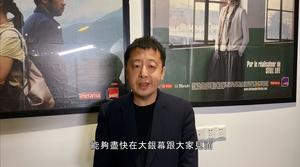 Chinese auteur Jia Zhangke came on an online show hosted by Hong Kong’s Broadway Cinematheque where film personalities shared what they had been missing during the lockdown. (PHOTO PROVIDED TO CHINA DAILY)
Chinese auteur Jia Zhangke came on an online show hosted by Hong Kong’s Broadway Cinematheque where film personalities shared what they had been missing during the lockdown. (PHOTO PROVIDED TO CHINA DAILY)
Wong says such has been the interest in the videos that HKIFF is now looking to have them all subtitled so as to reach as wide an international audience as possible.
As with film festivals across the world, HKIFF has also been exploring and promoting its non-traditional platforms as it seeks to keep film fans engaged across a period of time where, under normal circumstances, there would have been hundreds of screenings from their assorted programs going on all over town. Instead festival organizers have been stuck in their office, with plans for staging some version of the event over the summer currently being formulated.
“In some ways COVID-19 has forced some organizations to share more content with people who might not even come to festivals,” says Wong.


